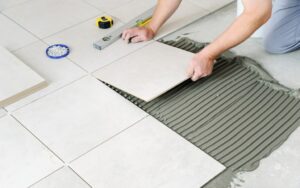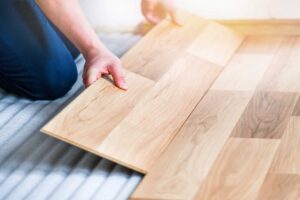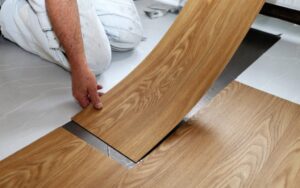When it comes to choosing flooring, we all want something that’s a breeze to clean. After all, who wants to spend hours scrubbing and mopping? Well, fear not! In this article, we’ve done the legwork for you and gathered information on the easiest-to-clean flooring options out there.
From sleek tiles to durable vinyl and hardwood, we’ll dive into the pros and cons of each type.
So sit back, relax, and let us guide you through the world of low-maintenance floors.
Key Takeaways Which Flooring Is Easiest to Clean
- Tile flooring is easy to clean with regular sweeping or mopping.
- Laminate flooring is resistant to scratches, stains, and fading and can be installed over existing floors.
- Vinyl flooring requires minimal upkeep and is water-resistant and stain-resistant.
- Hardwood flooring is durable and low maintenance, but excessive water and harsh chemicals should be avoided.
Tile Flooring
Tile flooring is the easiest to clean because you can simply sweep or mop it. One of the advantages of tile flooring is its durability, which makes it resistant to stains and scratches.

To keep your tile floor looking its best, regular sweeping or vacuuming is essential to remove dirt and debris. For deeper cleaning, mopping with a mild detergent solution will effectively remove any spills or stubborn stains. It’s important to avoid using harsh chemicals that could damage the tiles or grout. Additionally, periodic sealing of the grout lines can help prevent staining and make cleaning easier.
Transitioning into the subsequent section about laminate flooring, while tile flooring offers easy maintenance, laminate flooring also has its own set of advantages in terms of cleanliness and care.
Laminate Flooring
Laminate flooring is known for its low maintenance and simple cleaning process. It is a popular choice among homeowners due to its durability and affordability. When it comes to the installation process, laminate flooring is relatively easy to install.

It can be done as a DIY project or by hiring professionals. The cost of laminate flooring varies depending on the quality and brand, but it is generally more affordable compared to other types of flooring such as hardwood or tile.
Here are some key points about laminate flooring:
- Laminate flooring consists of multiple layers, including a wear layer, a design layer, and a core layer.
- It can mimic the look of hardwood, tile, or stone at a fraction of the cost.
- Laminate floors are resistant to scratches, stains, and fading.
- They are easy to clean with regular sweeping and occasional mopping.
- Laminate flooring can be installed over existing floors in most cases.
Overall, laminate flooring provides an excellent balance between aesthetics, durability, and affordability for homeowners looking for an easy-to-maintain option.
Vinyl Flooring
When it comes to low-maintenance and durable flooring options, vinyl is a top choice. Not only is it resistant to wear and tear, but it also requires minimal upkeep, making it perfect for busy households or high-traffic areas.

Additionally, vinyl flooring boasts water-resistant and stain-resistant properties, ensuring that spills and accidents can be easily cleaned up without leaving any lasting damage.
Low-Maintenance and Durable
Vinyl flooring is a popular choice for homeowners who want an easy-to-clean and long-lasting option. It offers a range of benefits, including low maintenance options and durability that can withstand everyday wear and tear. Here are some cleaning tips and tricks to keep your vinyl floors looking their best:
- Sweep or vacuum regularly to remove loose dirt and debris.
- Wipe up spills immediately to prevent staining.
- Use a damp mop with mild soap or vinyl floor cleaner for regular cleaning.
- Avoid using abrasive cleaners or harsh chemicals that can damage the surface.
- Place mats at entryways to trap dirt before it reaches the floor.
By following these cleaning practices, you can ensure that your vinyl flooring remains in top condition for years to come.
Now let’s explore its water-resistant and stain-resistant properties in the next section.
Water-Resistant and Stain-Resistant
One of the advantages of vinyl flooring is its resistance to water and stains, making it a practical choice for kitchens and bathrooms. Vinyl flooring comes in several waterproof options that provide an added layer of protection against moisture. This makes it ideal for areas prone to spills or high levels of humidity. Additionally, vinyl flooring is easy to clean and maintain, requiring minimal effort to keep it looking its best. Regular sweeping or vacuuming followed by a damp mop with mild cleaning products is usually sufficient to remove dirt and grime. To further protect your vinyl flooring from stains, it’s recommended to promptly clean up any spills or accidents. By choosing vinyl flooring with water-resistant properties and using appropriate cleaning products, you can ensure that your floors remain beautiful and durable for years to come.
| Pros | Cons |
|---|---|
| Water-resistant | Not as environmentally friendly as other options |
| Stain-resistant | May require professional installation |
| Easy to clean | Can be susceptible to scratches |
| Durable | Limited design options compared to other types of flooring |
Hardwood Flooring
Hardwood flooring is a popular choice due to its durability and low maintenance requirements. It can withstand heavy foot traffic, making it ideal for high-traffic areas in the home. In terms of cleaning, hardwood floors are relatively easy to maintain. Here are some key points to consider when it comes to the durability and cleaning methods for hardwood:
- Regular sweeping or vacuuming helps remove dirt and debris that can scratch the surface.
- Avoid using excessive water or harsh chemicals as they can damage the wood.
- Dry mopping with a microfiber mop is an effective way to clean hardwood floors.
- Using a mild cleaner specifically designed for hardwood floors can help remove stubborn stains without causing any damage.
- Applying a protective finish or sealant on the floor can enhance its durability and make it easier to clean.
Overall, with proper care and maintenance, hardwood flooring can last for many years while maintaining its beauty and charm.
Carpet Flooring
When it comes to carpet flooring, you’ll find that it offers a comfortable and cozy feel under your feet. However, keeping your carpet clean can be a challenge. But fear not! We’re here to provide you with some expert carpet cleaning tips and recommend the best carpet cleaning products.
Regular vacuuming is key to maintaining the cleanliness of your carpet. Make sure to vacuum at least once a week, focusing on high-traffic areas and using attachments for hard-to-reach spots. For stains, act quickly by blotting them with a clean cloth or paper towel. Avoid rubbing as it can spread the stain further.
To deep clean your carpet, consider using carpet shampoo or foam cleaners. These products penetrate deep into the fibers, removing dirt and stains effectively. Always follow the manufacturer’s instructions when using these products.
Now that we’ve covered tips for maintaining a clean carpet, let’s move on to another type of flooring: concrete flooring.
Concrete Flooring
When it comes to concrete flooring, there are several key points that need to be discussed: durability, maintenance requirements, and stain resistance.
Concrete is known for its exceptional durability, making it a popular choice for high-traffic areas such as garages and industrial spaces.
In terms of maintenance, concrete floors are relatively low-maintenance, requiring only regular sweeping and occasional mopping to keep them looking clean and polished.
Additionally, concrete floors have excellent stain resistance properties, making them resistant to spills and stains from common household substances like wine or coffee.
Durability of Concrete
Concrete floors are highly durable and require minimal maintenance. They are known for their exceptional strength and longevity, making them a popular choice for both residential and commercial spaces. Here are some key durability benefits of concrete flooring:
- Resistant to heavy foot traffic
- Can withstand the weight of heavy furniture and equipment
- Highly resistant to scratches, stains, and dents
- Not easily damaged by moisture or water spills
- Long-lasting with proper care and maintenance
When it comes to cleaning techniques, concrete floors are relatively easy to maintain. Regular sweeping or vacuuming can remove dirt and debris. For more stubborn stains, mild soap or detergent mixed with water can be used for spot cleaning. A soft-bristle brush or mop can help in scrubbing the surface gently without causing any damage. Additionally, applying a sealant every few years can enhance the floor’s resistance to staining and extend its lifespan even further.
Overall, concrete flooring offers excellent durability benefits while requiring minimal effort in terms of cleaning and maintenance.
Maintenance Requirements for Concrete
Now that we’ve discussed the durability of concrete flooring, let’s move on to its maintenance requirements.
Concrete floors are relatively low-maintenance, but they still require regular care to keep them looking their best. Here are some maintenance tips to help you maintain your concrete floors.
Firstly, it’s important to sweep or vacuum your concrete floors regularly to remove dirt and debris. This will prevent scratches and preserve the overall appearance of the floor.
Secondly, mopping with a neutral pH cleaner is recommended for routine cleaning. Avoid using harsh chemicals or abrasive cleaners as they can damage the surface.
When it comes to choosing cleaning products for your concrete floors, look for ones specifically designed for use on this type of flooring. There are many commercial options available that are gentle yet effective in removing stains and maintaining the shine.
Stain Resistance of Concrete
To keep your concrete floors looking their best, it’s important to choose a stain-resistant sealant. Stain resistance brings several benefits to concrete flooring, making it easier to maintain and clean. Here are five key advantages of stain-resistant sealants:
- Protection against spills: A stain-resistant sealant creates a barrier that prevents liquids from penetrating the porous surface of the concrete.
- Easy cleaning: With a stain-resistant sealant, spills can be easily wiped away without leaving any lasting marks or stains.
- Long-lasting appearance: The protective coating helps preserve the original color and finish of the concrete floor, keeping it looking fresh and new for longer periods.
- Reduced maintenance: Stain resistance minimizes the need for extensive cleaning routines and eliminates the need for harsh chemicals.
- Enhanced durability: By preventing stains, a sealant helps protect the structural integrity of your concrete flooring.
Considering these benefits, choosing a stain-resistant sealant is essential for maintaining clean and pristine concrete floors.
Now let’s explore another flooring option – cork flooring.
Cork Flooring
If you’re looking for a flooring option that’s easy to clean, cork flooring is a great choice! Cork flooring offers numerous benefits that make it a practical and low-maintenance option.
One of the main advantages of cork flooring is its natural resistance to dirt, dust, and allergens. The cellular structure of cork creates millions of air-filled pockets, making it difficult for particles to settle on its surface. In addition, cork is naturally antimicrobial and hypoallergenic, reducing the risk of mold or mildew growth.
When it comes to cleaning, regular sweeping or vacuuming with a soft brush attachment is usually sufficient to remove debris from the floor. For deeper cleaning, damp mopping with a mild detergent specifically designed for cork floors is recommended. Avoid using excessive water or harsh chemicals as they can damage the floor’s protective sealant.
With proper care and maintenance, your cork flooring will remain beautiful and easy to clean for years to come!
Bamboo Flooring
Bamboo flooring is a popular choice for homeowners due to its durability and renewable nature. It offers numerous benefits that make it an attractive option for those looking to upgrade their floors. Here are some key reasons why bamboo flooring is a great choice:
- Eco-friendly: Bamboo is a fast-growing grass that can be harvested every 5-7 years, making it a sustainable material.
- Durability: Despite being lightweight, bamboo flooring is incredibly strong and resistant to dents and scratches.
- Moisture resistance: Bamboo has natural moisture-resistant properties, making it suitable for areas prone to high humidity or moisture.
- Easy maintenance: Regular sweeping and occasional mopping are all that’s needed to keep bamboo floors clean.
- Versatility: Bamboo comes in various styles, colors, and finishes, allowing homeowners to find the perfect match for their aesthetic preferences.
When installing bamboo flooring, consider these tips: acclimate the planks before installation, ensure proper subfloor preparation, use a quality underlayment for added stability and noise reduction, follow manufacturer guidelines for installation methods and materials used, and leave expansion gaps around the perimeter to allow for natural movement of the bamboo.
Frequently Asked Questions
Are There Any Specific Cleaning Products That Should Be Avoided When Cleaning Vinyl Flooring?
When cleaning vinyl flooring, it’s important to know the best practices and avoid common mistakes. Some cleaning products should be avoided, such as abrasive cleaners or those containing bleach, as they can damage the vinyl surface.
Can Laminate Flooring Be Steam Cleaned?
Steam cleaning can damage laminate flooring because the excessive heat and moisture can cause warping and swelling. It is not safe to steam clean laminate floors as it could lead to costly repairs or even replacement.
Is It Possible to Remove Stains From Hardwood Flooring Without Refinishing the Entire Floor?
Removing stains from hardwood flooring can be possible without refinishing the entire floor. It requires careful spot cleaning and using appropriate cleaning solutions. On the other hand, vinyl flooring is generally easier to clean as it is resistant to stains and water damage.
How Often Should Carpet Flooring Be Professionally Cleaned?
Tile flooring should be professionally cleaned at least once a year to maintain its appearance and longevity. Concrete flooring, on the other hand, is low-maintenance and can be easily maintained with regular sweeping and occasional mopping.
Are There Any Special Maintenance Requirements for Cork Flooring to Keep It Looking Its Best?
To keep cork flooring looking its best, we should avoid harsh cleaning products that can damage the surface. Regular sweeping and mopping with a mild cleaner will suffice for maintenance.
Conclusion
After exploring the various flooring options, it is clear that tile flooring is the easiest to clean. With its smooth surface and water-resistant properties, spills and stains can be effortlessly wiped away.
Additionally, a fascinating statistic reveals that tile flooring has been found to reduce indoor allergens by 50%, making it an excellent choice for those with allergies or respiratory issues.
Its durability and low maintenance requirements make tile flooring a practical and hygienic option for any home or commercial space.




